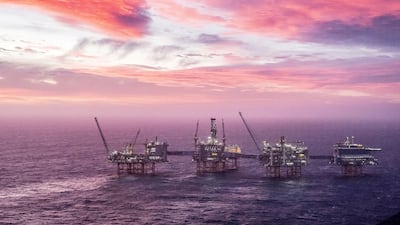In May, Kwasi Kwarteng, who was the UK secretary of state for business at the time, wrote that domestic oil and gas production “is now more important than ever, recognising … ongoing demand … over the coming decades as we smooth the transition to cheap, clean, home-grown energy”.
Mr Kwarteng is now the chancellor of the exchequer in the Cabinet of new British Prime Minister Liz Truss.
The urgent matter they must deal with is the unfolding energy price crisis that threatens to erode standards of living across the country and trigger an economic recession.
Today, Ms Truss is expected to push for more oil and gas extraction from the North Sea as well as champion the practice of fracking.
Reports suggest these plans include issuing as many as 130 oil and gas exploration licences — the first since 2020.
North Sea oil and gas production peaked in 1999 and proven reserves are dwindling.
One solution, fracking — or the practice of hydraulic fracturing to release hard-to-extract hydrocarbons — was banned in 2019 and reversing this could spark a political battle for which the government has little time or bandwidth.
Especially because obtaining more oil and gas this way is not a quick fix to the supply problems the country is facing.
Wholesale electricity and gas prices have been rising since the Covid-19 pandemic eased and the sharp rebound in economic activity led to a surge in demand amid constrained supply. European gas prices are 200 per cent higher than they were last year.
More recently, a reduction in Russian gas supplies has added to inflationary pressures in the market and the UK’s own energy production from all sources was already dipping, even before the pandemic.

Overall investment levels had also largely been in decline since 2014, mirroring the wider industry, although electricity sector funding has been steady. The weakness is that the country is reliant on imports to meet demand.
Electricity generation is reliant on gas (40 per cent in 2019) and low carbon sources like nuclear (17 per cent), solar and wind (23 per cent) account for almost all the rest. Coal and oil are about 5 per cent combined.
More than half of gas imports typically come from Norway via pipeline. There is also a pipeline network to the Netherlands and Belgium. The rest is LNG, predominantly from Qatar, the US and Russia.
Oil imports come from Norway and the US. So while the cut in Russian gas does not effect the UK as much as its neighbours, it is still vulnerable to rising prices and the cost of gas has doubled since June.
The long-term vision, as set out by Boris Johnson’s government earlier this year, is to reduce the dependence on imports through increased domestic production of renewables, “low carbon superfuel of the future” hydrogen and a “new generation of nuclear reactors”.
None of the above can avert the current crisis.
The proposed licensing round will not either, as it can typically take up to 10 years to take a field to production. That assumes no opposition and that levels of red tape are also reduced.
Price signals impact overall demand
Also, the billions of pounds in direct support to customers for their bills, and the freezing of prices for the next two years, could undermine efforts to improve efficiency by removing the obvious motivation to use less energy.
The push for energy efficiency was touted by Mr Johnson as the short-term action that could be taken to alleviate the crisis.
While Mr Johnson did concede the realities of energy transition, as we push to a net zero world, meant “we can’t simply pull the plug on all fossil fuels overnight without the lights going out all over Europe”.
He also vowed “we’re going to make better use of the oil and gas in our own backyard by giving the energy fields of the North Sea a new lease of life”.
However, the strategy to increase domestic sources of energy will probably need until 2030 before British consumers feel its full effects.


